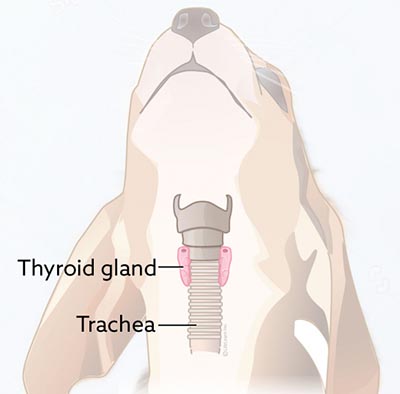The treatment choice depends on the size of the tumour, its invasion of surrounding tissues, the presence of metastases and whether there are symptoms present of a disturbed thyroid function.
Surgery
Surgery is advised when the tumour is not attached to the surrounding tissues (which is the case in 25-50% of thyroid tumours) and there are no metastases. Risks linked to surgery are possible bleedings, accidentally removing the nearby parathyroid glands (causing a disturbance of the calcium metabolism), larynx nerve damage and a reduced thyroid function when both thyroid lobes have to be removed.
Radiotherapy
Radiation is often used after surgery when residual tumour tissue is suspected or when surgery is not a good option (e.g. when the tumour is fused to the environment). Possible side effects of radiation consist of damage to the larynx, trachea and oesophagus, although in general, radiation is well tolerated. It is possible that after a while (months to years after treatment) insufficient thyroid hormones are produced. On the other hand, these hormones can be supplemented.
Radioactive iodine therapy
If the tumour absorbs enough iodine, radioactive iodine therapy is an interesting treatment option. Radioactive iodine is administered to the dog and will build up in the thyroid tissue. There, it locally radiates the thyroid tissue, including the tumour. Depending on the amount of thyroid tissue that gets destroyed, it might be necessary to supplement thyroid hormones after the treatment. The advantage of this treatment option vs radiation therapy is that radioactive iodine targets both the metastases of the thyroid tumour as well as the primary thyroid tumour very precisely (if both take up iodine). Moreover, if necessary, the treatment can be repeated without much side effects.
Treatment of thyroid carcinoma using 131 I can effectively alleviate clinical signs and reduce disease burden in a proportion of dogs. A study performed in 2022 showed that improvement of clinical signs was seen in 76.2% of dogs (32/42) and that the overall response rate was 35.3% (four complete and eight partial responses).
Chemotherapy
Chemotherapy can be considered for dogs with large, non-resectable tumours or numerous metastases, although the results for chemotherapy so far have not been as succesful as the treatments mentioned above. In some dogs with this tumour type good results were obtained (up to a year survival), but at this point it is unclear which dogs benefit from this.
Targeted therapy
In addition, off-label use of toceranib, a tyrosine kinase inhibitor has been described.

